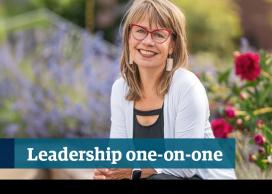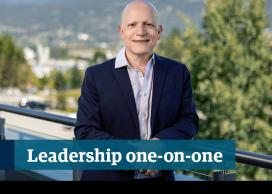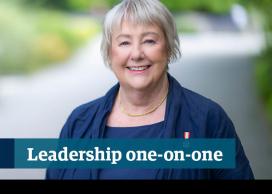Dr. Gage Averill is Provost and Vice-President, Academic, UBC Vancouver. In this role, he provides vision and leadership to the Faculties, oversees the budget, leads institutional planning, and ensures the university maintains excellence in teaching and learning.
He joined UBC as the Dean of the Faculty of Arts in 2010, where he played an instrumental role in creating new schools, institutes, research centres, and interdisciplinary programs. Over the span of his career, he has held various leadership positions, such as Vice-Principal, Academic, and Dean for the University of Toronto, Mississauga campus; Dean of Music at the University of Toronto; and Chair of the Department of Music at New York University.
Dr. Averill has won a range of teaching, research and literary awards over the years. As a renowned ethnomusicologist, his anthology of historic Haitian music also earned him a Grammy nomination. All of these accolades mark the different passions of his life. Outside of work, he enjoys biking and exploring nature.
Q1. What quality do you admire most in a leader?
GA: I admire people who lead with compassion. I also value honesty, curiosity, humility and the ability to think with an open mind and heart. My hope would be that I would approach each day with awe, humility and gratitude.
Q2. What makes you laugh?
GA: My wife and daughter make me laugh. My wife is from Trinidad, and there is a Trinidadian tradition called “liming,” which is the activity of sitting around and joking. Some of the best moments at home have been spent letting loose and liming with my extended family.
I also enjoy being around people who have a good sense of humour and are able to put others at ease, especially while trying to tackle difficult situations. Some other things that make me laugh include Gary Larson’s The Far Side; Steve Wright’s intellectual sense of humour; and stand-up comics such as Wanda Sykes.
Q3. Who inspires you, and why?
GA: Two academic administrators with whom I’ve worked who deeply impressed me were Martha Piper (one of UBC’s past presidents) and Frank Iacobucci (a Canadian jurist and former acting President at the University of Toronto). They demonstrated wisdom and a strong vision, led thoughtfully with compassion, and made sound decisions during tough times. I would like to have that kind of impact someday.
Q4. For you, what makes UBC different?
GA: UBC being situated on the Northwest Coast has a distinct advantage in terms of its location, which differentiates our institution from others. It is such a natural environment that is conducive to the development of brilliant conversations, ideas and work.
Based on Indigenous lands, we’re lucky to be in a resource-rich area that ties the great Pacific Ocean to the Asian Pacific and the Pacific Rim. I take pride in UBC’s commitment to Indigeneity, justice and reconciliation.
I truly believe it is the great quality of people at UBC that defines its success and makes it different. The creativity of our community members always amazes me, especially when I reflect on how much we have accomplished together.
Q5. What is the most important lesson you've learned, in your career to date?
GA: It’s a saying by Leo Tolstoy: “The two most powerful warriors are patience and time.”
This lesson has carried me through different phases of my career and life, and helped me focus on the importance of listening deeply and taking time to make decisions.
Q6. How do you like to recharge?
GA: I bike to work every day. I love my bike trips along the water, and I also kayak to work sometimes! Undoubtedly, my commute to work is one of the best parts of my day. I love the outdoors and look forward to my annual wilderness kayak trips in the summer or skiing trips in winter. In fact, I’ll be going kayaking to Clayoquot Sound this summer.
I also recharge by reading to my daughter every night, which helps me unwind after a long day.
Q7. What is the best advice you were ever given?
GA: I read a Vietnamese proverb many years ago that stuck with me: “In hell, people starve because their hands are chained to six-foot-long chopsticks, too long to bring the rice to their mouths. Heaven is the same, only there, people feed each other.” What this really shows is the role we all play in caring for each other, taking responsibility and supporting one another to drive the future generations forward.
I love a West African proverb that I’ve often quoted: “You know the future is in good hands when people plant trees under whose shade they will not sit.” This reminds me to think long term and consider how our actions today will impact the world tomorrow.
Q8. What do you value in your colleagues?
GA: I value colleagues who bring honesty and integrity to their work. I also enjoy working with people who have a good sense of humour. We should take our work seriously, but we don’t always have to take ourselves so seriously.
Q9. What do you hope will be your lasting impact at UBC?
GA: When I reflect on my role as Dean of the Faculty of Arts, I feel proud of the work we did to introduce long-lasting innovation at UBC – in our infrastructure, programs, and community.
Now in my role as Provost, I’d like to refocus on the university’s academic mission with an equity lens, where we continue to create a welcoming environment that enables people to do their best work. We need diverse thoughts and perspectives to find creative solutions to the challenges the world faces; for instance, a conversation about sustainability is incomplete without considering Indigenous perspectives and the perspectives of people on the margins who will be most negatively impacted by climate change.
Equally so, we need diverse leadership to uphold our position as one of the world’s leading universities. For this, we need to look at excellence along with diversity, equity and belonging as two sides of a coin, rather than two disparate elements of our vision. I hope to contribute to this work, and that this will be part of my lasting impact at the university.
Q10. If you could have a super power, what would it be?
GA: I would love to be able to transform into different species. For instance, if I wanted to fly, I could transform into a bird; or if I wanted to dive deep into the ocean, I could become a blue whale. It would be fascinating to experience creation in different ways. Inhabiting different species would also instill such a strong sense of empathy in anyone who could do it.
This super power fantasy stems from my love for nature and wildlife, and is related to my childhood dreams, where I’d often wish I could fly or live underwater.
Q11. How have your years of experience in academia shaped your leadership style as Provost?
GA: I attribute many of the valuable lessons I’ve learned over the years to being a keen observer. My experience in academia has also taught me how to deliver difficult news with empathy and respect.
I’ve also learned to appreciate that I am surrounded by people with different motivations and passions, and that listening to others’ perspectives and appreciating their viewpoint is paramount.
Q12. The last few years have brought about significant change in approaches to teaching, learning and working. What opportunities do you think this brings for the future of the university?
GA: When I joined UBC in 2010, I hoped to accelerate the use of digital learning and distance learning, along with experiential and work-integrated learning. It was fascinating to participate in the development of UBC’s Flexible Learning strategy to reimagine teaching practices. We created MOOCs, partnered with edX, adopted an experimental method towards blended learning, and made resources available online for our students. And while we already saw transformations in teaching and learning in previous years, the pandemic accelerated the pace at which we embraced technology in our work.
As we look into the future, it’s imperative to find ways to continue to utilize new technology in education – in a manner that supports our community. This is also an opportune time to maximize the potential of technology to expand our reach to a global audience and build stronger connections among people. My vision is to see UBC as a leader in this space: province-wide, nation-wide and globally. Some noteworthy initiatives I’m excited about are redesigning our approach to post-COVID teaching practices, a planning process called Academic Futures, and UBC IT’s Digital UBC framework.
All these advancements are aimed at preparing students for the future in rapidly changing times. It’s thrilling to imagine that our collective efforts today will enable faculty members and our colleagues to be more creative and transformative in teaching, to deliver compelling research for impact on our communities, and to advance UBC’s reputation as a globally leading university in the years to come.
Published: May 29, 2023
Interviewed by: Aditi Ghosh-Mooruth, UBC Internal Communications



